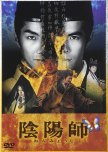
Not every country can boast that it had officially appointed sorcerers and diviners but Japan certainly can. Its onmyojis had practiced Japanese esoteric cosmology (that had been heavily influenced by China) since 7th century. The most famous onmyojis lived during Heian period when fine arts and sophistication were valued very high. So pop-culture usually portrays onmyojis as sly experts both in human nature and in natural sciences who could write poetry, navigate complex court politics, and observe the motion of the stars with the same ease.
The most legendary onmyoji in the history of Japan - Abe no Seimei - was so sly people said a kitsune gave birth to him. This Abe no Seimei is one of the central characters of this movie. He's played by Nomura Mansai who perfectly captures Abe no Seimei's fox-like nature. Nomura is a kabuki actor so he also gives his character a grace and manners suitable for the time period.
Ito Hideaki plays a court official called Hiromasa who serves as a foil for Abe no Seimei: Hiromasa is young, naive, and decent. For viewers who used to seeing Ito Hideaki playing hard-boiled detectives and cold-blooded murderers watching this young and foolish Hiromasa is very amusing. Abe no Seimei thinks so too and befriends him.
When Abe no Seimei's rival onmyoji bent on the world domination starts to threaten the capital city, it is this friendship that makes Abe no Seimei to take action. Naturally, sly onmyoji would not want to go to battle for such trivial matters as the end of the human world otherwise.
The movie consists of several cases as Abe no Seimei thwarts attempt after attempt of his rival to gain influence. The story is very lighthearted and simple despite some dramatic scenes.
The magic lore is portrayed quite thoroughly so if you've been seeing glimpses of it here and there in anime and J-dramas, this movie will finally put it all in a system.
While this movie premiered just one year before Lord of the Rings, CGI and other special effects are very bad. Costumes and sets make up for it somewhat.
All in all, this movie is nice lighthearted introduction to one of the most famous Japanese historical figure (and character archetype) and magic lore.
Cet avis était-il utile?

On paper, Unnatural is a case-of-the-week procedural about forensic pathologists but in reality it is masterfully crafted multi-layered show that it uniquely Japanese and has almost nothing in common with western shows like Bones. I believe that Unnatural could only ever be made in Japan, the same way Sherlock and Signal are unique products of the Great Britain and South Korea respectively.
One of the things J-dramas excel at is a workplace drama. These dramas focus on the life of everyday workers as they fight to achieve their goals and through that struggle find true belonging. There also must be a candid depiction of the work process for the additional educational value. One would think that the drama about forensic pathologists is very much in line with this genre. But it is not. Because in Japan pathologists (and any other workers that deal with dead bodies) are considered to be 'unclean'. This is also the reason the autopsies are almost never performed in Japan (because so few people agree to work in the unclean field).
On the other hand, Japan has a long tradition of dedicating dramas to social issues. And Unnatural bravely challenges the public perception of the profession and addresses the prejudices head on.
Thus, Unnatural is a 'punk' workplace drama with strong social message and a mystery plot. This is why it is made of so many different but complimentary ingredients that were handpicked by the show creator - the script writer Nogi Akiko. In fact it was her first original script; she wrote it after garnering success for her workplace dramas with strong female characters pursuing socially important missions (Nigeru wa Haji, Library Wars, Soratobu Kouhoushitsu).
Unnatural also features a female lead who is competent, emotionally distant, and has a considerable strength of character. She is a kind of hero that is very very rarely female. Moreover, she has a female colleague with whom she geeks over science and jokes about zombies.
And it is hard not to geek over science while watching this show because the autopsies are performed at the state-of-art laboratories using cutting edge technologies. It is no Mr Brain or Galileo with their fake science that breaks suspension of disbelief.
Apart from inspiring message, touching human drama, exploration of social issues (like various types of discrimination, bullying, and exploitation), cheeky humour, and science, Unnatural has plenty of other entertainment to offer.
Firstly, the cases are very unique and unpredictable. The characters are not actual law enforcers which allows for some grey morale leeway. There is also a love triangle (with the caveat that one must be well-versed in Japanese romance tropes to spot it) and unbelievable ensemble chemistry as in every given pair of characters has engaging interactions. There is no drop-dead-gorgeous people in the cast (except for Ichihara Satomi) or larger than life charismatic characters but, over all, the ensemble is so well balanced you can't pick a single uninteresting supportive character.
It should also be mentioned that Kubota Masataka was so unexpectedly cute in this show and his character so sympathetic that he was instantly casted in Radiation House (in a similar role) and in the upcoming 'asadora', a marker of a true mainstream recognition.
Finally, Unnatural has an enormous luxury of using Lemon by Yonezu Kenshi as its main theme which is a track that's been on top of the charts for two(!) years in a row.
Now let's list what one may not enjoy about this show. Unnatural deals with death and while it is not a dark show one would be hard-pressed not to cry at some scenes. There are also scenes where the characters extricate various fluids form dead bodies that are not graphic but are still mildly revolting. The show is dialogue heavy and the dialogues are medical jargon heavy so one needs to pay attention to get the plot and the jokes. One episode focuses on gender discrimination and has arguably unsatisfying resolution.
Cet avis était-il utile?
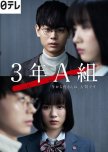
3 Nen A Gumi: Ima kara Mina-san wa, Hitojichi Desu
11 personnes ont trouvé cette critique utile
3 Nen A Gumi was produced by NTV for a time slot reserved for low budget experimental dramas such as Anata no Ban Desu and Todome no Kiss. These dramas are youth oriented so they aim both to entertain and to educate. While education value of the drama's message may vary, an action-driven plot and the most popular actors of the hour are a 'must have'.
An entertaining experimental drama with a strong message often polarises the viewers. Is imperfect execution forgivable if the message is important? What can be overlooked for a chance to see a brilliant (or gorgeous) actor performing dramatic scenes with a flourish? The answers to these questions determine whether the drama is worth watching.
3 Nen A Gumi, in particular, features arguably the most talented actor of his generation, an unparalleled Suda Masaki. He clearly gives his all to a performance of the character he also helped create. Watching him act is a pure pleasure.
Unfortunately, there is a downside to Suda's heavy involvement in the script. While he gets to act many dramatic scenes that showcase his ability, his character is also a classic Mary Sue. Self-righteousness of the main character and his omnipotence are a hard sell and no amount of fainting spells or tears can change that.
There is only one person who is capable of standing up to the main character - the local police officer - and the confrontations between the two are among the most tense moments of the whole drama. The fact that Shiina Kippei can keep up with Suda's acting really helps. And here lies another problem of this drama - inexperience of the young cast.
Suda's acting, unfortunately, obliterates even the best efforts of the students' actors. Suda is not someone to dial off his acting just to make costars look better even at the best of times. Here, with no young actors of Kamiki Ryunosuke's calibre in the cast, Suda remains unchallenged throughout the drama.
Another problem of the story is heavy-handed moralisation. The message of the drama is brilliant and timely. But it's delivered in a way that puts the viewer in the position of a student who has long since figured the problem out but has to listen to an overdrawn explanation given by a self-important smug teacher.
Many trappings of the drama (hypocritical levity of the people outside of the classroom or constant cuts to some recorded videos) look rather pretentious without bringing much to the story.
There is also a problem with male gaze which results in a fanservicey premise where one schoolgirl stalks another because that schoolgirl looks like a woman in a classic porn. Thankfully, we are spared any sexual tension between the main character and the female lead mostly due to the actors (and Suda's agape which kills off any chemistry).
Having said all that, I readily admit that when the drama dials up tension, it gets really good. The setting constantly strains suspension of disbelief and is over-the-top but it would work fine if other flaws were less glaring. The same way the accusations of over-acting seem unfair considering the requirements of the genre.
Ultimately, the bold if very unrealistic premise coupled with expressive acting and strong message would work really well for a duration of a movie. Stretched over many episodes, though, the message devolves to self-satisfied pontification, the tension bleeds away, and the young actors show themselves in unfavourable light. Such is fate of experimental drama - it dared where others didn't even if with mixed results.
Cet avis était-il utile?
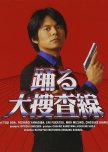
The 90-ies were a hard time for Japan. The bubble economy had burst and old values were constantly challenged as younger generation grew more and more disillusioned. The dramas of that time either depicted the bleak reality with ultra realism or completely glossed over it. Odoru Daisousasen, on the other hand, walks a fine line between staying an uplifting comedy and acknowledging the grim reality.
The drama's main character Aoshima becomes a police officer after getting fed-up with the way corporate Japan operates. He wants to make the world a better place and, maybe, to take part in some cool car chases and shoot-outs (American movies about hard-boiled cops were all the rage). To Aoshima's disappointment and to the viewer's amusement, though, it turns out that police is no different from the corporate: one needs to go through bureaucratic hoops to perform even the simplest of tasks, nepotism and inertia are ubiquitous, and the most excitement Aoshima can get is to drive the higher-ups places.
Most importantly, Aoshima wants the soulless system of the force to recognise humanity both of police officers and of those they serve. But heavy machinery of the system doesn't allow for such niceties and, moreover, doesn't care for the opinions of its cogs.
The face of this machine is Muroi, a big boss from HQ, who has no regard for the "grunt" workers of the small precinct and their initiatives. Muroi with his cold demeanour, perpetual frown, and lack of social graces is a perfect foil to affable and enthusiastic Aoshima. They embody two sides of the central conflict of the drama: the cogs vs the wheel, the human touch vs the bureaucracy.
What's brilliant in this drama (and what's rarely found in its successors) is that the conflict is very much real with no obvious winning side. It's true that taking care of the victims of crimes is important but it's also true that police force lacks resources for that. Bureaucracy is ineffective but it also protects society from power abuse by the force. As much as main characters want to make suspects cooperate by roughing them up, we as the viewers from 2020 know that this method cannot be condoned in 21st century.
Strengthened by the thematic conflict, the tense confrontations between Aoshima and Muroi are among the most dramatic scenes of the drama. Aoshima is no naive young man he seems to be - after all, he was a top performer of the sales department he worked in before - and he uses his wit, boundless enthusiasm, charm, and occasional guilt trips to gradually weaken Muroi's defenses (that poor tsundere guy).
But Aoshima is no Mary Sue and when he goes all out, the drama becomes uncomfortable to watch - a marker of good old Japanese storytelling that makes the viewers bite their nails as they watch a hero doing the right thing despite very obvious, very immediate repercussions.
The day-to-day life of police officers is shown very candidly and with great humour. The drama illustrates how Japanese police solves cases by throwing huge teams at them and how most cases are routine and simple affairs. The focus is often on the everyday heroism of ordinary officers which is to be expected from the country that doesn't believe that there are unimportant jobs however insignificant they may seem.
The drama was made in 1997 which excuses some of its old-fashioned elements (sexism, simplicity, and Showa era nostalgia). If you could watch Gokusen, GTO, or Hero without rolling you eyes, you would easily watch this too. Some things of the past like tamagotchi or fledgling internet are, on the contrary, are nice to see (if you lived in 90-ies). Hilariously, there is an episode that depicts younger generation as introverts who are obsessed with their gadgets which would have been Millennials bashing if the drama had not been made in 1997.
This drama was the first in Japan to realistically portray the life of police officers. Thus, it established many tropes for the genre. Most notably, the intense antagonistic relationship between the main character and another more competent or powerful officer has appeared almost in every police drama since (see BG, Bitter Blood, Tokyo Dogs, S Saigo no Keikan, etc). Seeing the drama where this trope originated really opens one eyes to the shortcomings of the successors.
Arguably, Odoru Daisousasen works so well because it was made in 1997. It was cutting-edge drama then which many modern dramas of the same genre fail to be.
I can't recommend this drama enough and I gave it 8.5 instead of 10 in order to be fair to other timeless classics. But for me personally it's a solid ten.
Cet avis était-il utile?
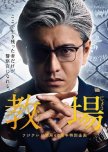
Who knew that studying in the police academy in the law-abiding Japan is so fraught with danger? Once the audience accepts that graduating this academy requires enormous grit, determination, and luck, though, the drama flows very well.
Kimura Takuya plays hard to please jerk-of-an-instructor that probably everyone encountered at least once in their lives. These kind of teachers (most of time) are not unfair monsters the students believe them to be; they are just strict and, perhaps, pedantic. As the viewers follow the perilous lives of several cadets, the mystery of whether Kimura's character is evil or benevolent slowly unfolds.
What deserves undeniable praise in this drama is the pacing. The tension is always high and poor cadets are never safe. The high quality production befits the star level of the cast. Many characters have brief stays in the drama, yet, leave long impressions.
Hayashi Kento deserves the most accolades among the cast. His performance brings to mind Elija Wood's cannibal from the Sin City; the level of creepiness is unbelievable. Nishihata Daigo and Tomita Miu also put impressive performances.
Cet avis était-il utile?

In Hand is a drama that shouldn't work. After all, one can't just mix cartoonish setting, serious topics, adventure/case-of-the-week structure, and gags about feces and expect it to work. Shockingly, the drama does exactly that and provides its viewer with lots of entertainment (if not much food for thought).
The incongruous premise includes one millionaire parasitologist (you read that right), one driven government official, and one conscientious doctor who combine their forces to investigate suspicious incidents related to parasites/epidemics etc.
The quasi-procedural structure surprises at first (after all, how common can a murder through deliberate parasite contamination be?!) but soon it becomes clear that the trio investigates not just murders but all of the cases of negligence and corruption in the medicine and wellness field. This also explains why the viewer is supposed to care about shenanigans in some smaller branch of government (that stands for a precinct in usual procedural).
While the cases are solved through the fakest of fake science and the touching moments at the end of each episode are arguably quite 'meh', the show has many strong points.
Firstly, the cartoonish setting is actually quite fun. It is very out there and takes a while to get used to, but it is also very coherent. Every small detail is there for a reason (like the parasitologist's need for an international passport gets tied to his past and is never forgotten throughout), every trapping is exploited (like how different types of animal screeches are used to underscore an awkward atmosphere or to add a sinister aura) and so on.
Secondly, the writing is quite tight which leads to a fast-paced story. While the parasitologist's flashback for example is hinted through ridiculously looking montage, when it is told it's quite logical and nicely ties into the overall story.
The running jokes and catchphrases are hilarious and charming. The banter between various characters is fun and entertaining while the dramatic moments have emotional believability (if not overall believability).
Finally, the characters deserve a special mention. A lot of the similar shows struggle because their leads turn out to be too arrogant and unpleasant while their side-kicks end up unsympathetic. In Hand doesn't have this problem.
During the first few episodes Hamada Gaku hard-carries many scenes as an instantly likeable short-tempered doctor. Yamashita Tomohisa's parasitologist takes a while to warm up to but the actor's contented aura helps a lot in selling the self-assured but not actually arrogant or unreasonable genius. Yamashita's deadpan delivery of phrases like 'feces is a diary of life' or 'there is nothing impossible for a genius' greatly contributes to the humour of the show.
Nanao's government official is also a funny character with a nice development. Her fierce determination allows for many hilarious office hijinks (considering that yelling at the boss is unheard of in Japan).
The drama boasts high budget so it's easy on the eyes and has a decent ost and sound design (not to mention, many big names in the cast). The drama itself is fun and unique and should not be taken at the face value or you'll end up with some really bizarre misconceptions (like believing that genetic doping exists).
The viewer should also beware the gross stuff. While there is nothing graphic, dangerous viruses and parasites are a lot more scary than the usual murderer-of-the-week and it's really easy to get grossed out by the concept alone.
Cet avis était-il utile?

Ushijima the Loan Shark Part 2
4 personnes ont trouvé cette critique utile
Ushijima the Loan Shark is a popular long-running franchise. Each installment can be watched independently. This drama, in particular, is more known due to its cast which includes:
- Yamada Takayuki, with his impressive presence that he projects without moving a single face muscle;
- Ayano Gou, whose brief appearances add levity and charm;
- Suda Masaki, who plays an unusually vulnerable character (if a petty criminal);
- Kubota Masataka, who plays the host number one if you can believe it;
- Kadowaki Mugi, who is as charming as ever (be aware though that Kubota's character and hers do sex work);
- Yagira Yuuya, who flexes his 'disgusting creeper' muscles.
Such a strong cast with many big stars usually appears only in the shounen manga adaptations (see Gintama or Rurouni Kenshin). But you should not let it bewitch you into watching this drama if the genre is not to your taste.
The brilliant actors have little trouble convincing the viewer to root for their characters. But the characters themselves are sliding down the slippery slop of bad decisions faster than the audience shouts 'stop! don't do it!' The cynical stories about flawed humans and the bitter consequence of their actions is quite an acquired taste. It doesn't help that the extras are getting raped and brutally killed in the background making it hard to stomach a story already overfilled with graphic violence. Two scenes, in particular, are chilling to the bone.
The viewers acclimatized to violence, though, would find the story quite mild and fairly entertaining.
Cet avis était-il utile?

Dele was conceived as part of the project that aims to bring Japanese novels to small screen. So the production team had a budget, a non-demanding time slot (night), and no expectation for commercial success. Kaneshiro Kazuki (the Border screenwriter) suggested to his friend, the writer Takayoshi Honda, to pen a short mystery novel that they would adapt as a drama. Before the story was written, the cast for the main characters had already been decided. As it happened several years before the premiere in 2018, it explains how they managed to snatch hugely popular now Suda Masaki.
I suspect that Suda and Yamada Takayuki both agreed to the project because of its "independent" production that featured alongside those two titans of Japanese acting many other members of creative elite. The best detective writers (the episodes were written by different authors while Takayoshi Honda was the main writer), the director, the operator, etc. were involved in the making of this drama out of sheer will to do something great just for its own sake and probably as a favour to the main project team.
Thus, everything in this drama is top-notch; there is no single non-artsy shot. Even the acorn used as a projectile in the first episode was admitted by the production team to be "ikeman acorn". The interior design of the office reminds you that "hipster" is not actually an insult. But even those tasteful decorations are constantly being elevated by the skillful lighting and unexpected shot angles. The pacing and the direction are on par with the visual. Concise storytelling, tight plot, appropriate ost - everything is done by true professionals.
It's as if the professionalism of the production team further underscores the professionalism of the main characters as if to remind you that watching masters do their job is a pleasure unto itself.
Getting back to the cast, this night slot drama that gets negligently small ratings boasts not only two of the best Japanese actors but also the likes of Shibasaki Kou and Hashimoto Ai acting as mere guest stars. Those tired with familiar faces in the dramas could also enjoy the many guest stars who are actually indie musicians and other rarely seen faces. Again, I suspect, other members of creative elite were starring as favours for friends.
The novel and the script were written with the cast already in mind so the main characters were tailored for their actors. But being who they are, Suda and Yamada managed to make their characters even better. The aloof Key in another hands would quickly deteriorate to Garu Sue but Yamada's understated acting gave the character the much needed subtlety and vulnerability. Suda infused his character with his trademark "pureness" and spirit while also performing the "wilding" scenes with violent outburst with appropriate rawness and energy.
Suda and Yamada also have great friendship chemistry and their scenes together are the best.
The story itself is a subversive mystery drama, the one that Japan does the best. A modern conflict (information security), unusual cases with unpredictable flow (even if you can guess the outcome some of the time), an engaging solutions, and the focus on the human heart amidst it all makes this drama a close relative of another great show - Unnatural. The subversiveness also comes from the fact that the main investigators aren't actually there to punish "bad guys" or to save "victims". They are just two clerks in the firm that takes responsibility to delete the designated files from the deceased's devices. This setup allows for more grey morale than J-dramas usually permit. It is perks of night slot again.
At the same time, the story is not too heavy or overly dramatic making us believe that such a firm could very well exist and not just in some manga world. Dry humour and fast pace also make for a great entertainment. Episodes are very different from each other being written by the different writers. The ep. 1, 5 and 8 are the main arc done by Takayoshi Honda while ep. 6 would be recognisable to the fans of The Border. Episode 3 is supposedly the main hit with the Japanese public.
All in all, I would recommend to watch Dele as one would enjoy a cup of coffee in a 'hip' cafe you somehow ended up in. Be surprised by well thought-out interior that is actually designed to make you comfortable and relaxed, marvel at the glinting cutting edge machinery that produces actually quite decent coffee, and think about art and its place in our life.
Cet avis était-il utile?

Gintama 2: Rules Are Meant To Be Broken
3 personnes ont trouvé cette critique utile
The all star cast of the first Gintama was expanded even more to include Miura Haruma and Kubota Masataka. Miura, perhaps, doesn't quite manage to make his character charismatic enough but his fans would still be pleased with his performance. Kubota, on the other hand, has a field day playing Hitokiri Bansai which is hilarious on too many levels.
Kubota famously played a samurai who fiercely clung to his life but was still ruthlessly killed by Hittokiri Battousai in the first Rurouni Kenshin movie. Here his character is the one who has to ruthlessly kill a small fry that refuses to admit defeat. Moreover, every time Bansai appears on the screen a variation on the Ruroken ost starts playing. Gintama (both manga and the movies) has many pop-culture allusions and homages so, of course, it was only a matter of time before Ruroken jokes made an appearance.
Other homage that is too hilarious for words is Evangelion. The whole movie is worth to watch just for this one joke. The characters of Okada Masaki, Oguri Shun, and Suda wearing drug to earn some money is also unmissable.
Yoshizawa Ryo's Okita and Hasimoto Kanna's Kaguya have great chemistry together as they do in the manga. The best 'frenemies' relationship between Yagira Yuuya's Hijikata and Oguri Shun's Gintoki is also a delight as we watch grumbling Gintoki coming to the aid of too hard-boiled for his own good Hijikata.
The story itself is more coherent than the one in the first movie. The climax may be a bit underwhelming but it's all in a good fun.
Cet avis était-il utile?

Library Wars is a great Japanese action movie. It has all of the ingredients that make action movies fun while staying uniquely Japanese. It earned high box office gross and critical acclaim which led to another movie and TV special being made. It also solidified Eikura Nana's image of an actress that reliably pulls off strong female characters and pushed Okada Junichi to the top tier of Japanese actors. In fact, Okada is now a definitive action leading man alongside Sato Takeru and Oguri Shun. Back in 2013, his professional fighting skills were still a novelty the same way it was not apparent that Japan film industry is able to produce high-quality action movies.
To make the movie possible three industry power-players were involved. Nogi Akiko, a great scriptwriter who would later pen Unnatural and Nigeru wa Haji, adapted the cult series of books written by Arikawa Hiro (both these women are also behind the popular tv drama Soratobu Kouhoushitsu that starred Aragaki Yui and Ayano Gou). Sato Shinsuke who by that time already had made his name with Gantz (and now has the Japan Academy Awards nomination for Kingdom) took the director chair.
The result of their work was fast-paced sleek action movie with impressive action sequences, charismatic characters, strong message, and just the right amount of humour and romance.
Kashara Iku played by Eikura Nana is instantly likeable as a gangly 'country-hick' girl who is so used to rough-housing with her three older brothers she doesn't hesitate to drop-kick her instructor at the smallest provocation. She is also loud, earnest, and awkward and serves as the perfect foil to the aforementioned instructor Dojo played by Okada Junichi.
Dojo is stoic and strict and always berates Iku for her brashness and idealism. He may be a lot shorter than towering Iku but his fighting prowess is unmatched by her. At the same time, his tsundere attitude can not hide the fact that he is just as brash and idealistic as Iku. Together, they form a couple that is unbelievably fun to watch, and their subtle romance is both hilarious and heart-warming.
Japanese storytelling is one of the best when it comes to the inspiring stories about dedicated team of like-minded people fighting for what they believe in. Library Wars is exactly such a story and it hits all the right notes.
The pacing deserves a special mention since the movie doesn't waste a single minute on unnecessary fanservice. It's swift and to the point.
Finally, supporting characters are played by the number of famous actors. Tanaka Kei may not be a perfect actor for his character but his comedy timing is spot-on. Fun fact: he was inspired during the shooting to follow Okada's tough training regime and, as a result, acquired his 'hot bod' which since became his trademark. Kuriyama Chiaki infuses her character with charisma and charm, while Fukushi Sota does what he does best and looks gorgeous.
All in all, this is a fun and uplifting action movie which will leave you feeling happy and content with the world.
Cet avis était-il utile?
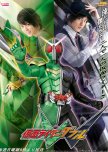
Tokusatsu genre has a bad rep. "Cringey", "full of overacting", "soulless money grab" are just several examples of accusations thrown at tokusatsu. Ultimately, though, the best tokusatsu dramas have much more in common with family-friendly classics than with shows for little kids. Think Hayao Miyazaki, Harry Potter, Doctor Who, or any given shounen manga - family-friendly just means it's exciting enough to keep kids engaged and that there is no nudity.
Kamen Rider W is exactly like this. Once the viewers accept the hyperbolic world-building and exaggerated acting as necessities of the genre, they are able to enjoy the complex multilayered story at the heart of the show.
The complexity is created by many factors. There is a postmodernism premise that includes main character (Hidari 'Left' Shotaro), a hard-boiled detective wannabe, who solves cases in hilariously family-friendly 'Gothem'-city. Naturally, his hard-boiled code of conduct requires him to religiously wear a fedora and to document all of his cases using a typewriter (while writing down Japanese words in Romaji). Little details like a giant industrial fan that obstructs the view from the private eye's office add further hilarity. Other characters never get tired of pointing out the ridiculous set-up providing much embarrassment for poor Shotaro.
There is, of course, a string of femme fatales but like any noir hero worth his salt Shotaro cares the most about his detective partner Philip. The duo of Shotaro and Philip is narrative gold. Shotaro is a character who does his utmost to pursue the toxic masculinity ideal but fails every time due to his compassionate heart and caring nature. Philip, on the other hand, is Shotaro's perfect foil - he looks delicate, he faints during Kamen Rider transformations, and he couldn't care less about any hard-boiled rep. He is also coldly rational and posses absolute knowledge and a raw power unmatched by Shotaro. In fact, Philip comes quite close to that toxic masculinity ideal.
This subversive interplay between character traits makes for charged conflicts and great character development.
Philip has a mysterious past full of abuse the extent of which is only hinted at. There are many similarly hard topics raised in the show but they are never spelled out due to the need to hide them from the young viewers.
The central arc is very coherent. New plot developments reliably catch the viewer unawares because the clever foreshadowing is easy to dismiss. The smaller arcs vary in quality, though.
The villains of the show are entertaining and relatable, and Akiko (the female lead) is one of those rare truly nicely done female characters. She may seem loud at first, but it's impossible not to like her several episodes in.
The acting deserves a special mention. Tokusatsu usually features young inexperienced actors. Kamen Rider W, though, struck gold with its leads. Kiriyama Renn who plays Shotaro was already a solid actor. He hard-carried many scenes keeping the right balance between exaggerated comic acting and more subtle one. On the contrary, Suda Masaki was playing his first ever role - Philip; indeed, he was just 16 years old. It turned out, though, that Suda was a genius.
Now, ten years since the premiere, no one in Japan doubts Suda's ability to act; after all, he received the 'Best Actor' academy award when he was just 25. However, he had never stood before the camera at the start of the Kamen Rider W shooting and it shows. Suda can barely act in the first episode; he struggles with Tokyo dialect having been raised in Osaka with its Kansai-ben; he visibly cringes when he needs to say a line about never trying Osaka's famous takoyaki. It's hilarious. But Suda needs just a couple of episodes to visibly improve. By the end of the show, he is a solid actor.
Watching one of the most acclaimed Japanese actor pick up acting skills at a neck-breaking speed is an entertainment all on its own.
((In fact, Suda's acting was too good. Once an actor proves himself capable, he never gets the simple roles popular in mainstream. The same way early careers of Ikematsu Sosuke, Ayano Gou, or Kubota Masataka are filled with roles of serial killers, rapists, and outcasts, Suda's career took an art house turn with endless variations of the young delinquent role. It took a lot of time and effort before Suda was back in the mainstream.))
The final layer of complexity comes from the many clever metaphors and world-building details. For example, Shotaro uses Joker Gaya-Memory while Philip uses Cyclone. The names seem silly until the whole story is revealed and the connection to the story progression becomes apparent.
Cet avis était-il utile?
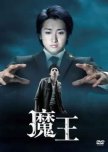
Maou's premise is great. Ikuta Toma and Ohno Satoshi - two of the most famous idols from Johnny & Associates - play the characters who are pitted against each other in a fight-to-the-death conflict. South Korean origins of the story provide tight plot, high level of suspense, and aggressive temperamental characters. Moreover, K-dramas take on the theme of revenge is very famous in its own right; the main intrigue of whether the characters will be able to reconcile or if someone will have to cut out their own tongue first never lets the viewer off the hook.
As usual with J-drama remakes some elements translate less convincingly than the others. The roughness of brash police officers like Serizawa Naoto is looked upon favourably in South Korea where it's the only thing that allows them to fight for justice in the face of many obstacles. As much as J-dramas love their rough police officers this kind of characters are firmly thing of the past and Ikuta Toma's Naoto looks out of place in Maou. It's never quite clear why his colleagues tolerate him and even his humbleness is not particularly endearing in the context of Japan where being humble is a default. Ikuta Toma has played many complex characters since Maou but he's not quite convincing in there. He doesn't look the part and he struggles in the dramatic scenes that call for display of raw emotions.
Ohno Satoshi's twisted sharply-dressed lawyer Naruse Ryo fits better in J-drama landscape than his nemesis. Ohno pulls off menacing aura well, however, his cherub visuals constantly spoil the effect and give the moniker “angel attorney” a more literal meaning.
Nevertheless, the story is tense and full of suspense. The strong support cast also deserve the praise. The characters of Tanaka Kei, Kichise Michiko, Okunuki Kaoru, and Oshinari Shugo are charismatic and relatable despite not having that many scenes. Even the introduction of psychic powers as investigative tool doesn't strain suspension of disbelief much.
What really detracts from the story is slow pacing especially during melodramatic scenes. The characters are understandably ravaged by strong emotions and feelings. However, the viewer can only take that many scenes with heroes crying 'woe-is-me' seriously. The overly-sweet romance doesn't help.
Personally, I don't like how the trappings of Catholicism are used in the story. Even taken at the face value, they don't bring that much symbolism. Naruse Ryo for all his omnipotence and plotting is not a devil incarnate and the way the drama treats past 'sins' seems quite removed from the western Christian tradition. Thus, it was hard not to roll my eyes at some of the scenes (of course, your take may be different from mine).
All in all, Maou is a gripping drama with some dubious creative choices. Discounting those choices, somewhat lacking acting of the male leads, and at-times slow pacing, the drama is quite enjoyable and I'd especially recommend it for the lovers of dramatic angst who usually avoid South Korean dark revenge dramas.
Cet avis était-il utile?
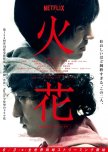
Hibana (Spark) is a drama produced by Netflix which means that its production team had an enormous budget and creative freedom. Both of those were used splendidly. Every shot is artsy, every secondary character is played by the likes of Sometani Shota and Kadowaki Mugi. More importantly, the drama was allowed to show the unvarnished lives of artists living on the fringe of society, and not on that decadence & debauchery kind of fringe - just the plain old 'don't have a place to stay' kind.
This 'plain old' down to earth feel is achieved through constant situational humour and occasional manzai performances. Despite the pathos of heart-wrenching conflicts, the drama never allows the viewer to take it too seriously. Thus, it stays in the realm of accessible art house rather than heavy drama.
The conflicts come from the grim reality of artistic field. Those who practice their art rarely have a luxury of a reliable job. In Japan, where the expectation for a man to be a breadwinner is still as strong as ever, the source of the main characters' reluctance to get involved with the women they genuinely care about is all too clear.
But the call of art is too powerful. Manzai, in particular, is an ancient art, and it's too easy to see the teachings of the Kamiya-sempai as a manzai-zen that the main character eagerly learns as a faithful adept. And in the ancient times 'ascetic' life style was a given. Moreover, only the most blessed get to worship the muse, and the threat of failure always hangs over artists. 'When will I have to give up my dream?' is a heart-breaking question all too familiar to those who still fight for their art even as their colleagues vanish in the corporate world or win the lottery of the big break. When the success finally comes it inevitably leads to the chorus of 'sell-out' accusations with the loudest voice being the artist's own.
Hayashi Kento and Namioka Kazuki give a wonderful nuanced performances all throughout the drama. They are great together; Hayashi Kento is especially good at portraying devotion so the viewer never doubts Tokunaga's loyalty to Sempai and his teachings. Namioka Kazuki's Sempai is so easily recognised, I'm sure everyone knows at least one such kind, charismatic, and hopeless sensei.
Suda Masaki and Kiritani Kenta replaced those actors for the movie version of Spark. While they are great actors in their own right, one can't help but wonder if more conventionally attractive appearances played the main role in that decision. The movie, by the way, is less raw and unvarnished, though, it still retains the notorious final scene.
Cet avis était-il utile?
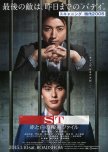
ST Aka to Shiro no Sousa File The Movie
2 personnes ont trouvé cette critique utile
All detective procedural dramas can only end in several ways. The main character either dies, commits a crime, or gets reassigned to a far away place. With its dedication to the genre and determination to use every cheap trick to amp the fun factor, ST was bound to have a subversive ending.
The end result was very much in style of the series. The movie also featured several of the most hilarious scenes in the whole series.
Cet avis était-il utile?
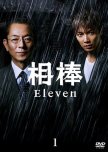
Aibou is a legendary show in Japan. Compare it with German Tatort, a show made to be enjoyed during leisure time while you are full with food and slightly drowsy. This kind of shows run for decades because they have winning formulas uniquely suited to their time slot.
For Aibou the formula includes the charismatic main character, his hot unruly partner, comic relief supporting characters, and elaborate cases that run the gamut from the classic closed room whodunits Agatha Christie style to the more innovative stories. Don't expect to guess the murderer, though, you would definitely fail. The show has not been running this long for no reason, after all.
This particular season is more known in the international fandom because the hot unruly partner is played by devastatingly gorgeous Narimiya Hiroki who is, I dare say, 'pimped out' here to the maximum. There is not a single episode where he doesn't wear a tight waistcoat over half-unbuttoned shirt with rolled-up sleeves. And if an occasion requires going outside, you may be rest assured that he would be sporting some new expensive coat in the military style. The contrast with the other characters make it all too obvious what Narimiya's role in this show really is.
This drama may be old-fashioned but it is quite solid and would make for a great dinner companion if it were available with dubbing.
Cet avis était-il utile?






















